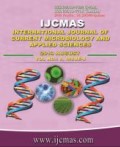


 National Academy of Agricultural Sciences (NAAS)
National Academy of Agricultural Sciences (NAAS)

|
PRINT ISSN : 2319-7692
Online ISSN : 2319-7706 Issues : 12 per year Publisher : Excellent Publishers Email : editorijcmas@gmail.com / submit@ijcmas.com Editor-in-chief: Dr.M.Prakash Index Copernicus ICV 2018: 95.39 NAAS RATING 2020: 5.38 |
Pigeonpea [Cajanus cajan L. Mill spaugh] is a prominent grain legume crop mainly grown in semi-arid tropics of the world. Pigeonpea pod borer (Helicoverpa armigera) is an important insect pest of Pigeonpea which maysometimes lead to 60 -80% losses of yield predominantly in Pigeonpea growing areas. The objective here was to appraise the inheritance of resistance pertaining to pod borer in case of Pigeonpea and to trace out the quantitative trait loci (QTL)governing pod borer resistance for the stimulation of the checking ofthe pest.150 recombinant lines of F6-7derived from the cross ‘H2001-4ʾ x ‘ICP7035ʾ were used. Out of which 84 lines were randomly chosen for the DNA studies. Single nucleotide polymorphisms were crucial for the generation of high-density linkage maps. The genetic variability studies have shown that there is significant variability for the traits under study in the population and also a wide range of variation in the mean values for the traits.Four characters studied were phenol content in pods (mg/g), reducing sugars (mg/g) and non-reducing sugars (mg/g), and protein content (%) in seeds. Correlation studies were made with respect to percentage of pod damage which depicted the significant correlation with the traits under study. Pigeonpea with early maturing, phenol content greater than 16mg/g with maximum range of 23 mg/g showed reduced percentage of pod damage. Phenol content in pod walls (mg/g) also showed significant negative correlation (-0.9508*), significant positive correlation with protein content (%) (0.8035*), significant positive correlation with non-reducing sugars (mg/g) (0.8631*) and positive correlation of 0.0624 (mg/g) by reducing sugars. The studies pertaining to correlation showed that high phenol content in pod walls resulted in low percentage of pod damage and lines with high amount of protein and reducing and non-reducing sugars showed more percentage of pod damage. After QTL analysis of all traits, QTLs have been identified for two traits i.e., reducing sugar and phenol content. Total number of QTLs identified was five, three for reducing sugars and two for phenol content Constant QTL has been identified for one trait (Reducing Sugar) in chromosome 5. The consistent QTLs identified were between CSCSP 14826- SCP 6824 respectively on chromosome 5 explaining the variation of 0.12 percent in environment one and 0.14 percent in environment 2 respectively. QTLs have also been identified for phenol content in pod walls but on different chromosomes. The correlation response and the identified QTLs will assist in marker assisted plant breeding practices for the development of cultivars having resistance to pod borer infestation.
 |
 |
 |
 |
 |